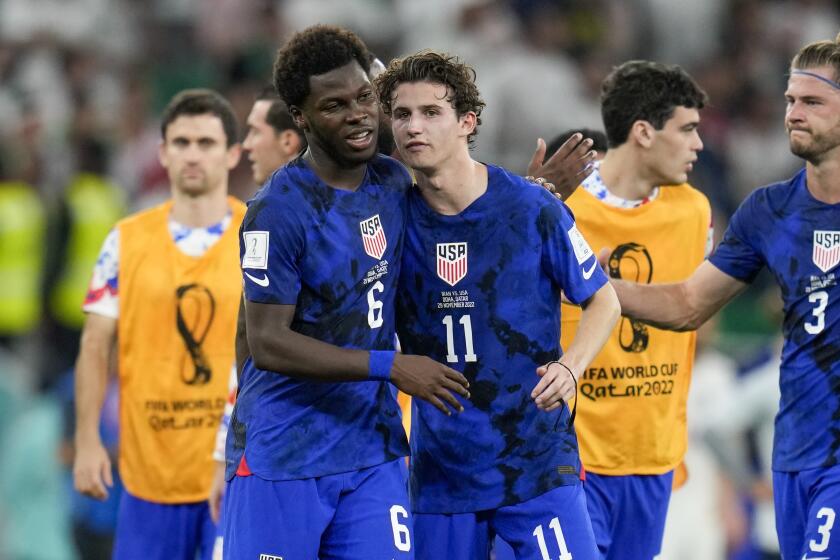World Cup: Americans’ goal is to win in knockout phase

The World Cup, U.S. coach Gregg Berhalter has grown fond of saying, is really two tournaments. The first, the group stage, is a four-team competition that simply qualifies teams for the main event, a single-elimination tournament that ends Dec. 18 with a champion.
The U.S. qualified for those playoffs Tuesday, beating Iran 1-0 to move on to the final 16. While past American teams considered it a success just to get out of the group, this team has bigger plans.
“Coming into the tournament, we had two goals,” Berhalter said. “The first was to advance through the group stage and then enter the knockout. And from here, anything can happen. All we need to do is play one game at a time. There’s no need to project how far this team can go.”
Midfielder Weston McKennie apparently didn’t get the second part of that memo because he said Tuesday he doesn’t see any reason the U.S. shouldn’t be playing for a title next month.
“We’re here for a purpose. We’re here for a reason,” he said. “A lot of people didn’t think that we would make it out of the group. The bigger picture is to make it as far as we can in the tournament and possibly play in the final.”
Only one U.S. team in the modern era has gotten as far as the quarterfinals, but that doesn’t mean this team can’t go further, defender Walker Zimmerman said.
Christian Pulisic scores the decisive goal in the 38th minute but is injured on the play as the United States defeats Iran to advance at the World Cup.
“Absolutely not,” he said. “Getting out of the group, we know that’s the [first] step. The only way you can win the World Cup is getting to the knockout stages. So that’s check mark No. 1. But you know, the conversation in the locker room is ‘Hey, we’re excited to win. But we have so much more from this group, so much more expectation from this team.’
“We said from the very beginning, we’re unpacked, we’re here until Dec. 19 in our head. We want to make that a reality and in order to do that, it’s taking one game at a time now. But we’re definitely not thinking of it as playing with house money.”
Qatari official contradicts previous migrant death toll
A top Qatari official involved in the country’s World Cup organization has put the number of migrant worker deaths for the tournament “between 400 and 500,” a drastically higher number than any previous estimated offered by the government.
The comment by Hassan al-Thawadi, the secretary-general of Qatar’s Supreme Committee for Delivery and Legacy, was delivered during an interview with British journalist Piers Morgan and threatened to reinvigorate criticism by human rights groups over the toll the Middle East’s first World Cup as taken on migrant laborers who built more than $200-billion worth of stadiums, transit lines and new infrastructure needed for the tournament.
In the interview, portions of which Morgan posted online, the British journalist asks al-Thawadi: “What is the honest, realistic total do you think of migrant workers who died from — as a result of work they’re doing for the World Cup in totality?”
“The estimate is around 400, between 400 and 500,” al-Thawadi responded. “I don’t have the exact number. That’s something that’s been discussed.” Previously Qatar had put the number at 40, 37 of which the Qataris described as nonwork incidents such as heart attacks.
“This is just the latest example of Qatar’s inexcusable lack of transparency on the issues of workers’ deaths,” said Nicholas McGeehan of Fairsquare, a London-based group that advocates for migrant workers in the Middle East. “We need proper data and thorough investigations, not vague figures announced through media interviews.
“FIFA and Qatar still have a lot of questions to answer, not least where, when and how did these men die and did their families receive compensation.”
The Associated Press contributed to this report.









